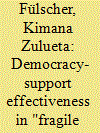|
|
|
Sort Order |
|
|
|
Items / Page
|
|
|
|
|
|
|
| Srl | Item |
| 1 |
ID:
130928


|
|
|
|
|
| Publication |
2014.
|
| Summary/Abstract |
Processes of political transformation and external assistance in fragile states have received increasing attention in the academic literature over the past decade. This literature, however, has not yet adopted a multi-dimensional categorization of fragility. This article discusses the evolution of the concept of fragility, and assesses the growing literature on processes of political transformation in fragile states, with a special focus on the quantitative literature and on the effectiveness of external democracy-support policies. Its novelty lies in its contribution to drawing links between these parallel bodies of literature. Furthermore, this article argues that, by incorporating a more complex definition of fragility, future research could reach more nuanced approaches on how fragility influences both processes of democratization and the effectiveness of democracy-support policies.
|
|
|
|
|
|
|
|
|
|
|
|
|
|
|
|
| 2 |
ID:
150905


|
|
|
|
|
| Summary/Abstract |
Rising renewable shares influence electricity markets in several ways: among others, average market prices are reduced and price volatility increases. Therefore, the “missing money problem” in energy-only electricity markets is more likely to occur in systems with high renewable shares. Nevertheless, renewables are supported in many countries due to their expected benefits. The kind of support instrument can however influence the degree to which renewables influence the market. While fixed feed-in tariffs lead to higher market impacts, more market-oriented support schemes such as market premiums, quota systems and capacity-based payments decrease the extent to which markets are affected. This paper analyzes the market impacts of different support schemes. For this purpose, a new module is added to an existing bottom-up simulation model of the electricity market. In addition, different degrees of flexibility in the electricity system are considered. A case study for Germany is used to derive policy recommendations regarding the choice of support scheme.
|
|
|
|
|
|
|
|
|
|
|
|
|
|
|
|
| 3 |
ID:
150745


|
|
|
|
|
| Summary/Abstract |
Renewable energy sources (RES) play a key role in the European Commission's 2030 Climate and Energy Framework, which aims for a low-carbon economy that increases the security of the EU's energy supplies and creates new opportunities for growth and jobs, among other benefits. We assess whether renewable energy deployment in Europe can provide this “triple dividend”, at which ambition levels of 2030 RES targets and what the role of the support policy scheme for electricity is. We apply two types of models: a detailed techno-economic sector model of the deployment of RES and two macroeconomic models. Our findings suggest that up to 2030 our triple-dividend hypothesis holds even under a declining role of Europe as technology provider for the rest of the world. Additional emission reductions of up to 1040 Mt CO2, as compared to a baseline scenario in 2030, are possible. Demand for fossil fuels can likewise be reduced due to the deployment of renewable energy sources by up to 150 Mtoe. More ambiguous is the order of magnitude of the effects on GDP and employment, which differs noticeably depending on the economic theory applied in the different models. Nevertheless, both models predict slightly higher GDP and employment in 2030 when implementing ambitious RES targets.
|
|
|
|
|
|
|
|
|
|
|
|
|
|
|
|
|
|
|
|
|